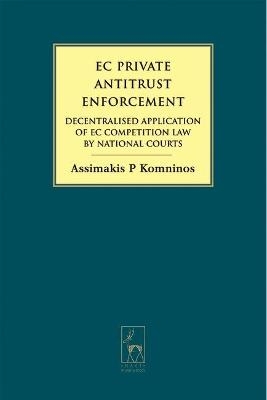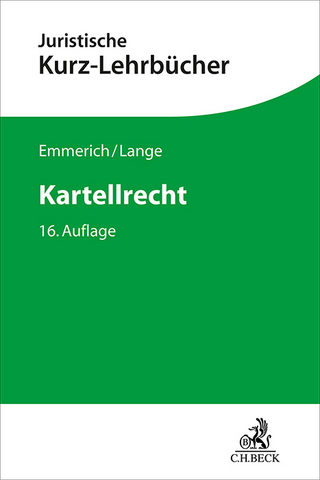
EC Private Antitrust Enforcement
Hart Publishing (Verlag)
978-1-84113-744-5 (ISBN)
- Titel ist leider vergriffen;
keine Neuauflage - Artikel merken
This book, written by an academic-cum-practitioner with substantial experience in the field of antitrust enforcement, presents the rise of private enforcement of competition law in Europe, especially in the context of the recent modernisation and decentralisation of EC competition law enforcement. In particular, the study examines the role of courts in the application of the EC competition rules and views that role in the broader system of antitrust enforcement. The author starts from the premise of private enforcement's independence of public enforcement and after examining the new institutional position of national courts and their relationship with the Court of Justice, the Commission, and public enforcement in general, proceeds to deal with the detailed substantive and procedural law framework of private antitrust actions in Europe.
The author describes the current post-decentralisation state of affairs but also refers to the latest proposals to enhance private antitrust enforcement in Europe both at the Community level, where reference is made to the December 2005 Commission Green Paper on Damages Actions and its aftermath, and at the national level, where reference is made to recent and forthcoming relevant initiatives.
Dr. Assimakis P. Komninos is a Local Partner at the Brussels office of White & Case LLP, a visiting lecturer at IREA - Universite Paul Cezanne Aix - Marseille III and a visiting research fellow at University College London (UCL).
1. EC PRIVATE ANTITRUST ENFORCEMENT I. A Delimitation of EC Private Antitrust Enforcement: Definitions and Modalities (a) Definition 1 (b) The Modalities of EC Private Antitrust Enforcement (i) Sword-Shield Litigation (ii) A titre principal-a titre incident Litigation (iii) Administrative-Public Enforcement-Civil-Private Litigation (iv) Stand-alone-Follow-on Litigation II. Public and Private Antitrust Enforcement and the Objectives of EC Competition Law (a) Enforcement Objectives (b) Advantages of Private Antitrust Enforcement and its Complementarity with Public Enforcement (c) The Relevance of the Goals of EC Competition Law: Between Public and Private Interest III. The Independence of Private Antitrust Enforcement (a) Independence as Principle (b) The Commission Green Paper and National Competition Laws on the Independence of Private Enforcement (c) Practical Problems in the Interrelationship between Public and Private Enforcement: Settlements, Leniency, Amount of Fines and Damages (i) Settlements (ii) Leniency (iii) Fines and Damages 2. THE INSTITUTIONAL LAW ASPECTS OF THE APPLICATION OF EC COMPETITION LAW BY NATIONAL COURTS I. The Old Administrative Authorisation and Notification System (a) The 'Foundational' Public Enforcement System (b) Competence of Civil Courts to Apply Articles 81(1),(2) and 82 EC (c) Competence of Civil Courts to Apply Article 81(3) EC (d) The Case of Block Exemptions (e) The Case of Comfort Letters (f) Competence of Civil Courts in Merger Cases? II. The Advent of Modernisation and the Passage to a Legal Exception System (a) The 1999 White Paper and the Reasons that Lay behind it (b) Modernisation and Decentralisation between Substance and Procedure (c) The 'Legal and Cultural Revolution' of the 1999 White Paper (i) Is Subsidiarity Relevant? (ii) The Basic Revolutionary Elements of the 1999 White Paper (iii) The Compatibility of the New System with the Treaty (iv) Efficiency of Competition Law Enforcement under the New System (v) Consistency and Coherence of the New Enforcement System (vi) Legal Certainty in the New Enforcement System (d) The New Regulation 1/2003 III. The Pillars of the New Decentralised System of EC Competition Law Enforcement: 'Centralised Decentralisation'? (a) Strengthening the Supremacy of Community over National Competition Law (i) The Confirmation of the Broad Nature of the Effect on Trade among Member States (ii) The Relationship between National and Community Competition Law-The Pre-existing Unsatisfactory State of the Law (iii) The Relationship between National and Community Competition Law-The Supremacy Rule of Article 3 of Regulation 1/2003 (iv) The Progress Brought by Article 3 (b) The New Institutional Position of National Competition Authorities and the European Competition Network (i) The Powers of NCAs under the New System (ii) Cooperation Mechanisms within the European Competition Network (iii) Allocation of Cases (iv) Exchange of Information (c) The New Institutional Position of Civil Courts (i) The Powers of National Courts under the New System a. The Courts' New Competence to Apply Article 81(3) EC b. The Specific Language of Regulation 1/2003 c. Remnants of Public Enforcement Monopoly: Withdrawal of the Benefit of a Block Exemption Regulation d. The New Competence to Enforce Commission Commitments Decisions (ii) Co-operation Mechanisms between the Commission and National Courts (iii) The Right of National Courts to Seek the Commission's Assistance a. Reinforcing an Already Existing Procedure b. Procedural Questions (iv) Information Exchange between the Commission and National Courts (v) The Duty of Member States to Transmit Copies of Judgments to the Commission (vi) The amicus curiae Mechanism (vii) Other Indirect Co-operation Mechanisms or Support for National Courts a. Guidance Letters b. Regulation 1049/2001 (d) Strengthening the Supremacy of Community over National Proceedings (i) Masterfoods and Article 16 of Regulation 1/2003 (ii) The Scope of the Supremacy Rule a. Positive Binding Effect v. Negative Duty of Abstention b. Non-applicability of the Supremacy Rule to National Competition Authorities' Decisions (iii) The Concept of 'Conflict' a. Maximalist or Minimalist Interpretation? b. Crehan and the House of Lords (iv) Resolution of Conflicts between Commission and National Civil Court Proceedings a. First Scenario: Pending National Court Proceedings and Envisaged or Final Commission Decision b. Second Scenario: Non-final National Court Judgment and Envisaged Commission Decision c. Third Scenario: Final National Court Judgment Finding Inapplicable the Competition Rules and Envisaged Applicability Commission Decision d. Fourth Scenario: Final National Court Judgment Finding a Violation of the Competition Rules and Envisaged Inapplicability Commission Decision e. Fifth Scenario: The Special Case of Commission Commitment Decisions under Article 9 of Regulat
| Erscheint lt. Verlag | 22.2.2008 |
|---|---|
| Verlagsort | Oxford |
| Sprache | englisch |
| Maße | 171 x 234 mm |
| Themenwelt | Recht / Steuern ► EU / Internationales Recht |
| Recht / Steuern ► Wirtschaftsrecht ► Wettbewerbsrecht | |
| ISBN-10 | 1-84113-744-8 / 1841137448 |
| ISBN-13 | 978-1-84113-744-5 / 9781841137445 |
| Zustand | Neuware |
| Haben Sie eine Frage zum Produkt? |
aus dem Bereich


